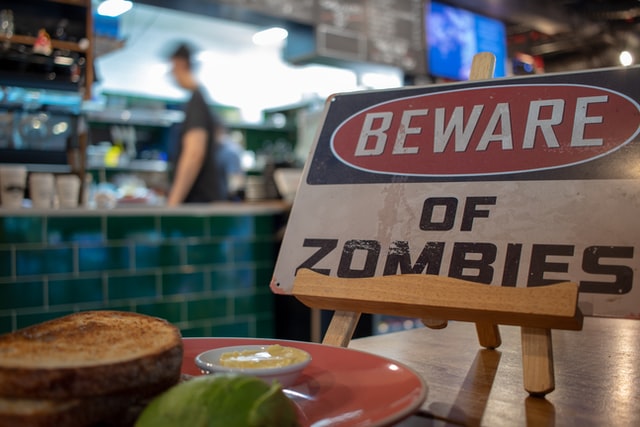By Riffat Yusuf
Part 1 of The Zombie That Ruled Grammar for Infinite Eternity – a trilogy no less spellbinding for having been authored anonymously – explores the short-lived collaboration between the protagonist, an aspiring writer, and their editor. The novel’s self-published author, who remains unidentified since taking their first Zoom call with CIEP in a Boris Johnson mask (or was it?), granted permission for us to reproduce excerpts of an early, edited draft.
 Chapter 2
Chapter 2
And then, after the deathly knock at my front door – tintinnabulum operatus est, as the plaque very clearly states, but bear with since this is a macabre Halloween tale – arose a mewl. An eerie whine, all the more unsettling for the inclusion of an adult voice, ‘Trick or treat?’
AQ1 Please don’t use and or any other coordinating conjunction at the start of a sentence. Since is a time adverb; use because instead.
There they stood, a pillowcase, net curtain and dustbin liner arrayed between them: a ghoul, a ghost and their undead parent.
AQ2 There are three characters here, among rather than between.
‘I’d like a treat, please,’ said I – for quipping is my plume de forte – ‘and then you’re welcome to move on.’
‘None of us,’ said the muffled voice of Number 54’s youngest resident, adjusting his plastic mask, ‘are going nowhere.’
AQ3 Double negative for authenticity is fine, but none is followed by is.
‘None of us,’ insisted the mask, ‘ain’t going nowhere until you pass a message on.’
AQ4 A preposition such as on at the end of a sentence is not a usage up with which English grammar should put.
 ‘On,’ entombed the voice, ‘to your copyeditor. Tell them to not impose rules predicated on the say-so of dead people who tried, over centuries past, to squish English grammar into a Latin-shaped syntax.’
‘On,’ entombed the voice, ‘to your copyeditor. Tell them to not impose rules predicated on the say-so of dead people who tried, over centuries past, to squish English grammar into a Latin-shaped syntax.’
AQ5. Abrupt character development here – see Chapter 1: ‘the gormless snivel, progeny of the Drydens next door’. Also: entombed or intoned?
I was beginning to wonder if sweet little Johnnie wasn’t, in fact, a descendant of England’s very first Poet Laureate. He, whose mission to save English grammar from decimation, has stood firm for over 300 years.
AQ6 What a spooky coincidence: I am a huge fan! To channel the spirit of John Dryden, use decimation if you mean reduce by one-tenth. Also, don’t use over with quantities; more than is correct here.
Hopefully, the sudden chill that was creeping vampirically through my veins was little more than the want of a cardigan.
AQ7 Only use hopefully as a sentence adverb if you wish to say that the chill was operating in a hopeful manner.
There was something untoward at hand.
To say the least.
A pus-oozing, gnarled hand.
A prop. Courtesy of Johnnie’s mum – she often lends a hand (!) at school plays.
Thrusting a bucket towards me.
A bucket bearing the label ‘read me’.
AQ8 Regarding sentence fragments: you haven’t replied to my email from last week, so I cannot rule out that ‘The Zombie That Ruled Grammar for Infinite Eternity’ isn’t earmarked for academic submission. I would, therefore, ask you to redraft to include any missing subjects or verbs.
Therein, among the five-pence pieces and donations of Poundland confectionery – too many spendthrifts and nary a dentist living on this street – I found a book. A 64-page booklet, to be more precise, entitled Bad Advice: The Most Unreliable Counsel Available on Grammar, Usage, and Writing.
Chapter 3
[Our narrator has finished reading John E McIntyre’s delightful take on prissy pedantry.]
I chuckled at ‘peevers gotta peeve’, intending to fully pass off McIntyre’s observation as my own in my next communiqué with my editor. Suddenly, I shuddered a morbid shiver of dreaded realisation. No, it wasn’t the guilty swell of imminent plagiarism. Was it …? Could it …? Surely not.
Surely my editor wasn’t one of those unquestioning souls cursed to forever observe what Arnold Zwicky called zombie rules?
I read over all the amendments my editor had suggested. And then it hit me like a Bloomsbury rejection letter: not a single one of the rules my editor had prescribed was a cast-iron canon of copyediting.
AQ9 In my defence, Strunk and White’s ‘The Elements of Style’ says that split infinitives are …
 I spurned my editor’s advice and googled like a banshee for editorial guidance that would drive a garlic-laced spike into the style and grammar cobweb enmeshing me. Where were the editors ready to pour distilled daylight on the corpus of zombie rules?
I spurned my editor’s advice and googled like a banshee for editorial guidance that would drive a garlic-laced spike into the style and grammar cobweb enmeshing me. Where were the editors ready to pour distilled daylight on the corpus of zombie rules?
AQ10: Hyperbole?
A minute later, I found James Gallagher, a slayer of ‘rules that refuse to die’. His three reasons for our reluctance to let go of groundless grammar are unnerving. He says, ‘People’s use of grammar is also tied up in their self-perception and it’s used to broadcast their level of education. It’s also used as a barricade to prevent others from accessing their realm.’
I reflected on my own language snobbery and insecurities, searching for an editor who might release me from ‘an unnecessary and awkward straitjacket’. Why, Erin Brenner, of course! The clarity she dispatches in her adroitly reasoned blog posts would disperse all lingering zombie doubts. From hopefully to however and from since to split infinitives, Erin exposes the conflations of grammar and style that allow zombie rules to take root in the first place. But way less wordily than anything I have written. (And a CIEP fact sheet on zombie rules is now available too…)
Chapter 63
I leave you, dear reader, with a penny of wisdom gleaned from my cautionary tale. Half is for the apostrophe I very confidently leave out of Halloween. And the remaining ha’penny is for people like you (yes 100% like, not such as: thank you, McIntyre p18) without whose patience and solicited nomination for the Booker Prize, The Zombie That Ruled Grammar for Infinite Eternity might never have been written. Perish the thought.
 Riffat Yusuf is a West London-based proofreader and copyeditor, and a content editor for a small structural engineering company. She has been editing since 2018, and before that she taught ESOL for 10 years and brought up her family. In the dim and distant past she was employed in journalism, radio and television. In the future, she’d like to work on ELT resources.
Riffat Yusuf is a West London-based proofreader and copyeditor, and a content editor for a small structural engineering company. She has been editing since 2018, and before that she taught ESOL for 10 years and brought up her family. In the dim and distant past she was employed in journalism, radio and television. In the future, she’d like to work on ELT resources.
Photo credits: Beware of Zombies by Chris Hall; Hands by Daniel Jensen; Person behind fog glass by Stefano Pollio, all on Unsplash.
Posted by Abi Saffrey, CIEP blog coordinator.
The views expressed here do not necessarily reflect those of the CIEP.

I love absolutely everything about this.
Too, too kind. I’m going to hide that compliment and then feel all surprised when I find it. You know what I mean!
This is delightful! Well done, Riffat, and thanks for including me.
Erin, this is the actual absolute truth: I couldn’t have written it without your AMAZING blog posts. I simply couldn’t replicate the standard, authority and clarity of the guidance you give. But I also didn’t want to write yet another filler piece. Why reinvent a faultless wheel? If I could write like you, Erin, I would. I must also mention Robin Black whose contribution was vital to steering this piece way from a complete horror story.
Thank you very much for the compliment! I’m blushing over here.
Thank you for this wonderful piece Riffat. Your humour beautifully conveys each point!
Thank you, Sarah. Your kind words are most appreciated.
I’m a year late to the party, but thanks very much for this Riffat. I really enjoyed it. And I also feel slightly liberated after reading it!
I thank you for reading it. Vive la viverté!
Is this not just opening the door to accept bad English? I have been noticing an insidious movement in schools where there is little emphasis on sentence structure, punctuation, good grammar. Call me old fashioned but it used to be important and I preferred that world. Hopefully there will be room for both.